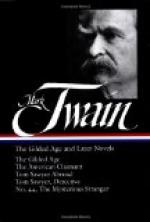disturbed by it. The main feature of the feast
was a piping hot Irish stew made of the potatoes and
meat left over from a procession of previous meals.
Everybody was liberally supplied with this dish.
On the table were a couple of great dishes of sliced
ham, and there were some other eatables of minor importance—preserves
and New Orleans molasses and such things. There
was also plenty of tea and coffee of an infernal sort,
with brown sugar and condensed milk, but the milk
and sugar supply was not left at the discretion of
the boarders, but was rationed out at headquarters—one
spoonful of sugar and one of condensed milk to each
cup and no more. The table was waited upon by
two stalwart negro women who raced back and forth
from the bases of supplies with splendid dash and
clatter and energy. Their labors were supplemented
after a fashion by the young girl Puss. She carried
coffee and tea back and forth among the boarders,
but she made pleasure excursions rather than business
ones in this way, to speak strictly. She made
jokes with various people. She chaffed the young
men pleasantly and wittily, as she supposed, and as
the rest also supposed, apparently, judging by the
applause and laughter which she got by her efforts.
Manifestly she was a favorite with most of the young
fellows and sweetheart of the rest of them.
Where she conferred notice she conferred happiness,
as was seen by the face of the recipient; and; at the
same time she conferred unhappiness—one
could see it fall and dim the faces of the other young
fellows like a shadow. She never “Mistered”
these friends of hers, but called them “Billy,”
“Tom,” “John,” and they called
her “Puss” or “Hattie.”
Mr. Marsh sat at the head of the table, his wife sat
at the foot. Marsh was a man of sixty, and was
an American; but if he had been born a month earlier
he would have been a Spaniard. He was plenty
good enough Spaniard as it was; his face was very
dark, his hair very black, and his eyes were not only
exceedingly black but were very intense, and there
was something about them that indicated that they
could burn with passion upon occasion. He was
stoop-shouldered and lean-faced, and the general aspect
of him was disagreeable; he was evidently not a very
companionable person. If looks went for anything,
he was the very opposite of his wife, who was all
motherliness and charity, good will and good nature.
All the young men and the women called her Aunt Rachael,
which was another sign. Tracy’s wandering
and interested eye presently fell upon one boarder
who had been overlooked in the distribution of the
stew. He was very pale and looked as if he had
but lately come out of a sick bed, and also as if
he ought to get back into it again as soon as possible.
His face was very melancholy. The waves of laughter
and conversation broke upon it without affecting it
any more than if it had been a rock in the sea and
the words and the laughter veritable waters.




